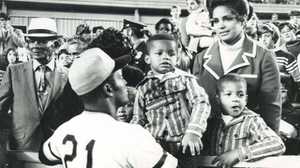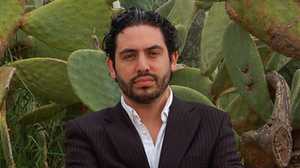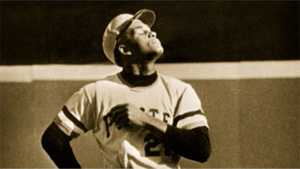Cepeda and Clemente
Filmmaker Bernardo Ruiz looked to a distinguished group, including Clemente’s family and some lifelong friends, to tell the story of Roberto Clemente. Read excerpts from his interview with legendary first baseman Orlando Cepeda, an All-Star slugger who ranks among top hitters like Babe Ruth, Lou Gehrig, Joe DiMaggio, Mickey Mantle and Albert Pujols. Here, Cepeda remembers meeting Clemente in Puerto Rico in the Fifties, and describes the two worlds they both lived in.

Puerto Rican Baseball
When I was growing up, Puerto Rico was a very poor country. It used to be rich people and poor people. So, even though my dad played pro baseball… we grew up very poor…
My father [legendary player Pedro Cepeda]... was a great baseball player. In those days, a black player didn’t have a chance to play in the big leagues. So my dad used to go to Cuba, used to go to Dominican Republic, Venezuela… I think he went to Mexico one year…. In 1947, the Yankees went to Puerto Rico and played the Puerto Rican All-Stars. And my dad was 44 years old and he went like four-for-four against the Yankees…
The first time I saw Roberto Clemente was in 1950… In those days, softball was a big game in Puerto Rico… my father used to coach a team called Juncos, los mulos de Valenciano. That team used to be like the Yankees. Everybody wants to play ball for Juncos, because of my father — he was so well-known.
Roberto was 15 years old… And I recall that when they told him that he didn’t make the team, he started crying… He didn’t make the team because he was so young, and they had a couple established shortstops in the team. And I recall my dad told the guy — that was Roberto Marin, who brought Roberto to the team — he said, better not to give up — you know, he’s very young, he’s very talented. He’s gonna make it.
And then, in ’52 — I think ’51 or ’52 — the Brooklyn Dodgers came to Puerto Rico. And they have a tryout at San Juan’s ballpark. I went to see that. And then we became good friends right after that… What impressed [Dodgers scout] Al Campanis about Roberto was his arm — because Roberto had a rifle… So, I know Roberto from way, way back.
I recall in 1948 or ’47, Brooklyn came to Puerto Rico to play ball, spring training, and Jackie [Robinson] came with the team. So I remember I was with my dad — the team used to stay at the hotel across the street from the ballpark — so Jackie was coming out, and my dad told me, “Someday you play in the big league because of this guy…” Looking back, what Jackie went through is incredible.
The Santurce Crabbers
Roberto signed with [Puerto Rican pro baseball team] Santurce Cangrejeros [“The Santurce Crabbers”]... And then in ’54 I was a batboy for Santurce Cangrejeros, and I got to know Roberto very well. Then in ’55 when I signed with Santurce, that’s when Roberto and I became close… He had a 1956 Chevrolet Bel Air, green and white. So we used to go out, we used to date together. He used to pay for everything! Because he made more money than me…
Willie Mays played [for Santurce Cangrejeros in] 1954. Before that, ’53, Bob Thurman… and so many great black players — George Crowe — they used to call them the Esquadron de Panic… And Roberto used to play left field for that team, Willie Mays played center field, and Thurman played right field. And they had Luis Olmo, who was the second Puerto Rican who played in the big league. So, Santurce Cangrejeros was a team of all black players, maybe two white guys… In the winter, they have nothing to do, because they can’t play ball, they can’t make no money — so they all used to go to Puerto Rico. And Roberto was right there.
He was my idol in ’54… the way he ran the bases, he hit .343… I was catching balls from him while he was learning how to scoop the ball and throw at the same time… Willie [Mays] was teaching him how to do that. And I remember every time Roberto threw… the ball almost break my hand… because he throw the heavy ball, you know, he have a great arm, also a heavy ball.
I recall one time – Roberto played Triple A for Montreal — so when he came to Puerto Rico, he was the talk of the town. The first couple games, he went three-for-four and three-for-four, and everybody started talking about Roberto Clemente. And he was inspiration to all of us.
Life in the Segregated U.S.
Being around Roberto and Willie Mays really made me feel that I wanna be a baseball player. Then when I signed in ’55, I came for the tryout, to New York Giants in Florida, Roberto was coming to Pittsburgh spring training. So we flew together… I was scared, I’d never been on the plane before. We flew together from San Juan to Florida, and Roberto took care of us — José Pagán, myself, and two more Puerto Ricans… And right after that, he used to write to us, saying, you know… you’re black Puerto Ricans, you’ve got to be careful.
When we came to Florida… we had to wait for a black taxi driver to take us to headquarters because the white taxi driver, he didn’t wanna take us over there. Well, I was shocked. It was a novelty. And then, the following day, we went to the town — I went to Walgreens, and they kicked me out of there. And, things like that, I was shocked! You know, to me, I knew about it, but to experience that, is very difficult…
My first year, I played in Virginia for three or four weeks. Then I went to Indiana, and my teammates, they treat me great. We used to go out on the trip, and they told me, “Stay here,” so they used to bring me food to the bus… I was very lucky they took care of me.
But we played in places like Missouri, Illinois — very bad… My manager and his wife, they took care of me, because I was only 17…
Roberto came to the big league in 1955. I came in ’58 — still was problems, like St. Louis, Cincinnati, Pittsburgh, Chicago — problems. [Roberto] told me that it was very lonely… he couldn’t communicate… Some of the teammates didn’t treat him so nice, and that’s why — we have two strikes: being black, and being Latin.
[Once, in 1959] I asked Roberto where we should go to have lunch. He said, “Well, there’s a place in downtown Pittsburgh called Danny’s Lounge. Go there…” So, we were walking into the place, and they told us, “Already we have the people who are going to do the dishes.” I said, “No, we are baseball players.” They said, “You gotta get out.”

Gaining Recognition in Puerto Rico and the States
When I first met Roberto, it never came to my mind that one day we would be honored in Puerto Rico in the same day… he told me, “This is like a dream, that we’re here…”
We couldn’t wait to go back to Puerto Rico. In fact, every year we start in November, just before Thanksgiving. To play in Puerto Rico, for the Puerto Rican people to have the opportunity to see us play ball, make us feel very, very good and proud to be a Puerto Rican!
When we first came [to the States] — he came in ’54 to the big leagues, I came in ’58 – before that, they didn’t have too many Latin ballplayers — Luis Aparicio from Venezuela, nobody from Dominican, Felix Mantilla, Juan Pizarro… And for us, Puerto Rican, to lead the league in hitting, RBI for one year — that was amazing. You know, Puerto Rico is such a small island… They didn’t think Puerto Ricans had the skill, the mental capacity to play in the big league. So what we did, bringing the Puerto Rico Triple Crown, made us feel very, very proud. And that’s why that year, I played 150 games [in the U.S., then], I went to Puerto Rico, I played about 80 games. And Roberto did the same.
My brother keep telling me, “What you are doing is incredible… for the Puerto Rican people.” Even the Puerto Rican people in New York City feel the same way because we went to New York for three days… they told us, “thank you.” And then going to Puerto Rico — such a huge welcome there in San Juan — the whole island went crazy…
Latin players… have to do… so much more than other ballplayers to get recognition. We did, you know. In ’58, my rookie year, I was hitting .358 by the All-Star game — I didn’t make the team… it took a long, long time to get, to give the Latin players what we deserved…
When I was inducted to the Hall of Fame in ’99, Roberto came to my mind, and I spoke in Spanish to the Puerto Rican people, because, well, Roberto, when he spoke Spanish that day, in ’72, it really touched my heart… so proud to be Puerto Rican, and right there was a great opportunity to let everybody know, to let the Puerto Rican people that we care for you, that I’m proud to be Puerto Rican, that I like to share this great moment with all of you.
Clemente on the Field
When you played Pittsburgh, they had great players, you know – Willie Stargell, Donn Clendenon, Bill Mazeroski — but Roberto was the guy who can beat you many ways. You know, throwing, running, fielding, hitting. So Roberto was the key guy, you know — how we gonna stop Roberto? If you go to first base, you know, don’t make a big turn, because he liked to throw behind the runner and get you out.
I was amazed by Roberto! I remember in Pittsburgh, I hit a ball to right-center, so I was thinking triple, and then I saw Roberto catch the ball. Even though I was mad, but, wow, what a play!
I remember playing St. Louis one time, I was with the Cardinals in ’67. [The count was] 3 and 2, Lou Brock running with the pitch, I hit a ball to right field, and he threw Brock… out at home plate. And Lou was shocked! When Manny Sanguillén was running for the ball, normally the right field threw to second base, but Roberto threw the ball all the way to home plate and Lou was shocked — everybody was shocked! You know, that was Roberto. So, watching him play, even though he played in the other team, used to thrill other players.
One time in Pittsburgh, in the old ballpark, Forbes Field… I’m looking for Roberto, Roberto’s laying down, covered from head to toe. I said, “What’s wrong with Roberto? He don’t feel too good.” I went inside, I told [Juan] Marichal — he was pitching — “Watch out for Roberto tonight. He’s sick, he don’t feel good. Watch out for him.” [laughs] He went four-for-four, hit two triples, and threw a guy [out] from right field… [laughs]
Clemente’s Character and His Legacy
My first time at bat, in ’55, with Santurce… I went 0-for-three. I was very down. After the game… he said, “You know what? It won’t be the first time you’re gonna go 0-for-three, won’t be the second time — if you play in the big league, someday you will be there. Don’t worry about it — it’s always tomorrow…” And not only to me, to the other kids, to other rookies — he always motivated people… he always go out of his way to help other people.
I remember in ’68… before he was leaving, coming to Puerto Rico, he called me and said, “Orlando, do you want me to bring anything to Puerto Rico? You want me to call your mother, you OK? Anything? What do you want me to do?” I said, “No, no, no, I’m OK. I go, today is Sunday, I’ll be in Puerto Rico in five days, so thank you, Roberto.” You know. He was always that way — “What can I do for you?”
He was like a brother… he was like that with everybody… Roberto’s best friend was the batboy — he used to take care of the batboy everywhere. So he always go for the underdog, he go out of his way to help other people. That’s why he died the way he died — because he cared about people so much…
My brother-in-law used to live about four houses from Roberto. So December 27 [in 1972] I took my wife to see her brother, and Roberto was there, at his house, so I went to say hi. And he said, “You should go with me to Nicaragua…” I said, “Roberto… you have been on TV for five straight days… raising money for Nicaragua — take it easy.” And he said, “I have to do it. Nobody can do it for me.”
Young ballplayers, they want to use number 21. And they have this Roberto Clemente Award… and this is wonderful, because he deserves that. Because not only he was a great baseball player, but he was a great human being.








